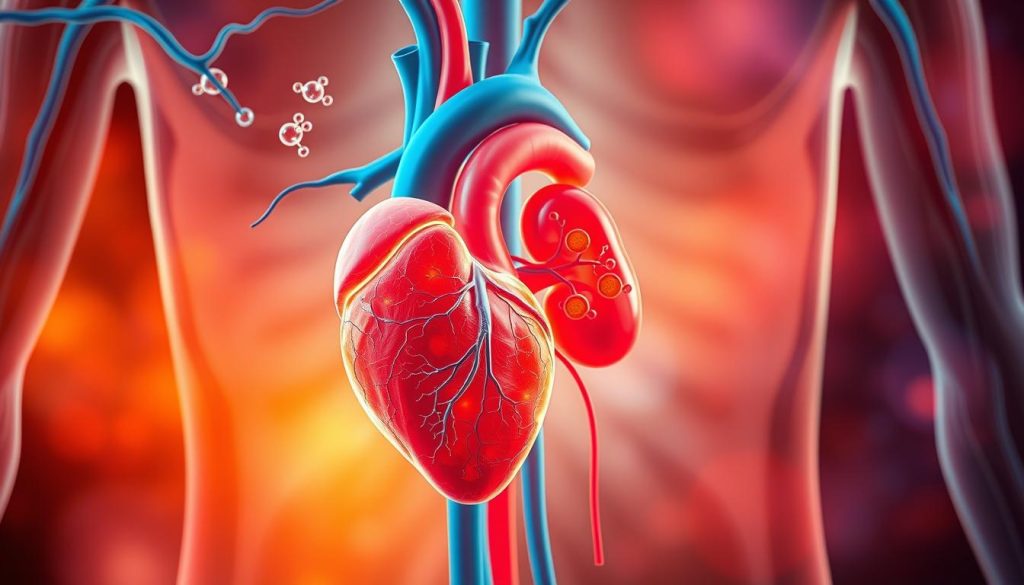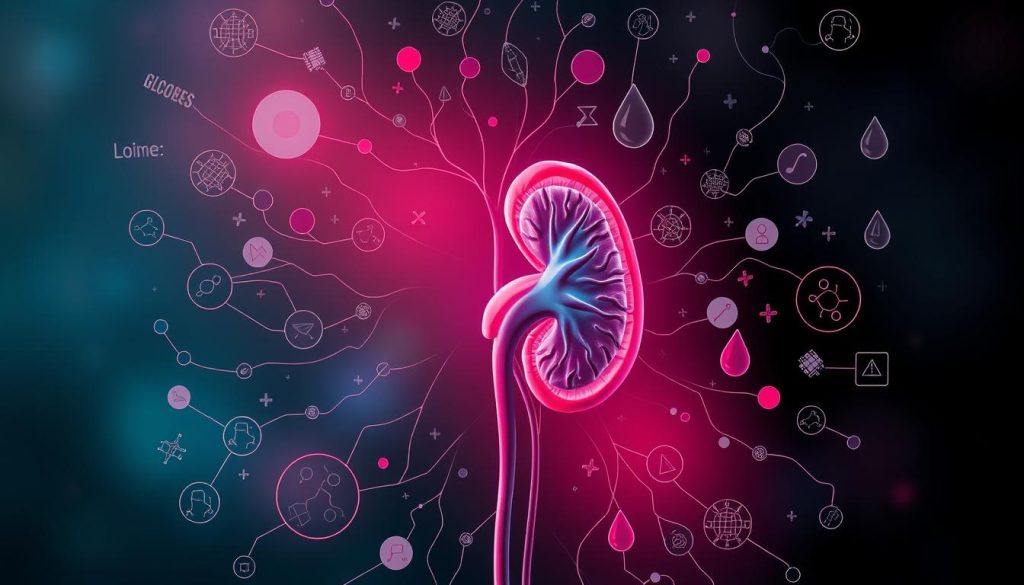Diabetes mellitus nephropathy is a serious issue in diabetes care. It shows how diabetes affects the kidneys. Knowing about it is key for both patients and doctors to fight chronic kidney disease.
Diabetes can lead to kidney problems that worsen over time. These problems can cause kidney failure. Catching it early and treating it well can help prevent this.
We will look at new ways to fight diabetic kidney disease. But first, we must recognize the dangers, spot the signs, and act fast to stop diabetes mellitus nephropathy from getting worse.
Unpacking Diabetes Mellitus Nephropathy
Diabetic kidney disease, also known as diabetes mellitus nephropathy, is a major health issue. It’s a big reason for chronic kidney disease and end-stage renal disease worldwide. Knowing about its causes and how it affects health is key to prevention and treatment.
What Is Diabetes Mellitus Nephropathy?
Nephropathy in diabetes means the kidneys slowly lose function over time. High blood sugar levels damage the kidneys, making it hard for them to filter waste. This can harm a person’s health and put a strain on healthcare systems.
The Epidemiology of Diabetic Kidney Disease
Studies show diabetic kidney disease is a big problem, leading to illness in many people. How fast it gets worse can vary a lot. This depends on genetics, environment, and lifestyle.
Pathophysiology: How Diabetes Affects the Kidneys
The way diabetes harms the kidneys is complex. High blood sugar causes changes in the kidneys, like thickening of the glomerular basement membrane. These changes make the kidneys work harder and eventually fail. Knowing this can help find ways to slow down kidney damage.
| Country | Prevalence of Diabetes | Incidence of Diabetic Kidney Disease |
|---|---|---|
| USA | 10.5% | 40% of Diabetic Patients |
| Canada | 9.3% | 38% of Diabetic Patients |
| UK | 6.2% | 35% of Diabetic Patients |
Recognizing the Symptoms of Diabetic Nephropathy
Diabetic nephropathy is a serious problem linked to diabetes. It’s hard to spot and manage. Knowing the early signs and when to see a doctor is key to stopping it from getting worse.
Early Warning Signs of Kidney Damage in Diabetes
Spotting diabetic nephropathy starts with noticing its early signs. Look out for protein in your urine and rising blood pressure. These signs are often small and easy to miss. It’s important for people with diabetes to watch for them to catch the disease early.
When to Seek Medical Attention for Diabetic Renal Disease
Seeing a doctor quickly can make a big difference. If you notice changes in your urine, swelling, or high blood pressure, get help. These could mean your kidneys are not working right.
| Symptom | Description | Advice |
|---|---|---|
| Proteinuria | High levels of protein in urine | Regular urine tests |
| Swelling | Swelling in legs, ankles, or feet | Consult doctor, reduce salt intake |
| Increased Blood Pressure | Persistent high blood pressure readings | Regular monitoring, seek medical advice |
Contributing Factors to Developing Nephropathy in Diabetes
Knowing the risk factors for diabetic nephropathy is key to stopping it before it starts. Several important things can increase your chance of getting this serious renal complication in diabetes.
- Poor glycemic control
- Hypertension
- Genetic predisposition
By managing these factors well, we can slow down the start and growth of diabetic nephropathy.
To change these factors, we need to keep a close eye on them. We should make lifestyle and medical treatment changes. This is mainly about keeping blood sugar and blood pressure in check. Here are some facts:
| Risk Factor | Impact | Management Strategies |
|---|---|---|
| Poor glycemic control | High | Regular monitoring, Insulin therapy |
| Hypertension | Medium to High | Medication, Dietary changes |
| Genetic predisposition | Medium | Genetic counseling, Early screening |
Managing diabetic nephropathy well means we must find and tackle these risk factors head-on. This careful approach can lessen the harm of renal complications in diabetes.
Diagnosing Diabetic Kidney Disease
Managing diabetic kidney disease starts with early and accurate diagnosis. Finding kidney damage early is key. It lets doctors use specific treatments to slow the disease’s progress.
Essential Tests and Evaluations for Diabetic Nephropathy
To spot diabetic nephropathy, doctors use several tests. These tests check for kidney damage and how severe it is. This info helps doctors choose the right treatment.
- Urine Albumin-to-Creatinine Ratio (UACR): This test shows how much albumin is in urine daily. It’s a key sign of diabetic nephropathy.
- Serum Creatinine Test: This blood test checks creatinine levels. It shows how well the kidneys are working and helps find kidney damage.
- Estimated Glomerular Filtration Rate (eGFR): Based on the serum creatinine test, eGFR gives a quick look at kidney function.
Understanding Your Diagnostic Results
It’s important to understand your test results. High albumin in urine and low eGFR mean kidney damage. Catching this early is critical for managing the disease.
| Test | Normal Range | Concerning Range |
|---|---|---|
| Urine Albumin-to-Creatinine Ratio | >30 mg/g | |
| Serum Creatinine | 0.6-1.2 mg/dL | >1.2 mg/dL |
| eGFR | >60 mL/min/1.73 m² |
Knowing your test results helps you work better with your doctor. This leads to better disease management and a better life.
Advancements in Diabetic Nephropathy Treatment
New innovations in renal disease management are changing how we treat diabetic nephropathy. Now, treatments aim to not just ease symptoms but also fix the root causes of diabetic kidney disease.
Next-generation medicines are leading the way. They are made to protect the kidneys better and keep them working longer. These new medicines are showing promise in clinical trials. They might have fewer side effects and work better, improving life quality and outcomes for those with this condition.

- SGLT2 inhibitors help control blood sugar and protect the kidneys by promoting glycosuria.
- Nonsteroidal mineralocorticoid receptor antagonists (MRAs) reduce fibrosis and inflammation in diabetic kidneys.
- GLP-1 receptor agonists, known for heart benefits, also show promise in kidney health.
More research and funding are coming to find treatments that last longer. Here’s a look at the therapies being explored:
| Therapy Type | Focus Area | Status |
|---|---|---|
| SGLT2 inhibitors | Glucose control and renal protection | Ongoing multiple large-scale trials |
| MRAs | Reduction of kidney fibrosis | Phase 3 trials |
| GLP-1 receptor agonists | Cardio-renal outcomes | Increasingly prescribed, under further study |
These new treatments show how diabetic nephropathy treatment is evolving. With each new discovery, there’s hope for changing the course of diabetic kidney disease. This brings hope to millions worldwide.
Effective Management Strategies for Diabetic Nephropathy
Managing diabetic nephropathy well needs a mix of medicines and lifestyle changes. This approach helps slow down kidney disease.
Pharmacological Interventions for Diabetic Renal Disease
Treating diabetic nephropathy aims to stop kidney damage and ease symptoms. ACE inhibitors or ARBs are key. They lower blood pressure and cut down proteinuria, a sign of kidney disease. These drugs also protect the kidneys.
Lifestyle Modifications to Manage Nephropathy
Lifestyle changes are very important for diabetic kidney disease. Key changes include:
- Dietary changes: Eating less sodium and avoiding high protein helps control blood pressure and kidney load.
- Regular exercise: Staying active helps manage blood sugar and blood pressure, key for kidney disease treatment.
- Smoking cessation: Smoking speeds up kidney damage. Quitting is a must for those with diabetic nephropathy.
Adding these lifestyle changes and regular check-ups can improve life quality and slow kidney damage in diabetic renal disease patients.
| Intervention | Benefits |
|---|---|
| ACE Inhibitors/ARBs | Reduces proteinuria, lowers blood pressure, and provides renal protection. |
| Dietary Adjustments | Helps in maintaining optimal blood pressure and reducing strain on kidneys. |
| Exercise | Improves overall cardiovascular health and aids in glucose management. |
| Smoking Cessation | Prevents further deterioration of kidney function. |
Prognosis of Diabetes Mellitus Nephropathy
Knowing the diabetic kidney disease prognosis is key for both patients and doctors. Several factors affect this prognosis. These include comorbid conditions, the disease stage at diagnosis, and how well the disease is managed. We’ll look at how these factors impact patient outcomes.
Renal complications in diabetes can greatly change the disease’s course and patient’s life quality. Early detection and effective management are vital for better health and longer life. It’s important to manage diabetic nephropathy through medical treatment, lifestyle changes, and regular check-ups.
- Following the doctor’s medication plan.
- Regular checks on kidney function and blood sugar.
- Making healthy lifestyle choices like diet, exercise, and quitting smoking.
Teaching patients about their disease is key in managing diabetic nephropathy. It helps them understand the impact of their diet, exercise, and sticking to their medication.
| Factor | Impact on Prognosis |
|---|---|
| Early diagnosis | Potentially better outcomes with early intervention |
| Comprehensive management | Slows progression of renal damage |
| Comorbid conditions | May complicate management and worsen prognosis |
| Patient education | Enhances self-management, improving prognosis |
In conclusion, the diabetic kidney disease prognosis depends on many factors. These include effective disease management and patient lifestyle and education. By focusing on these areas, healthcare providers can help patients live better lives, despite the challenges of renal complications in diabetes.
The Role of Diet in Managing Diabetic Nephropathy
Following a special diet is key to slowing down diabetic kidney disease. By sticking to renal health nutrition, you can improve your kidney function and overall health. This part talks about the important changes in your eating habits to help your kidneys and control blood sugar.
Key Nutritional Considerations for Renal Health
It’s important to watch your mineral and fluid intake if you have diabetic kidney disease. You should avoid foods high in sodium, potassium, and phosphorus to protect your kidneys:
- Sodium: Eating less sodium helps keep your blood pressure in check, which is important for managing diabetic kidney disease.
- Potassium: Potassium is good for muscles, but too much can be harmful if your kidneys aren’t working right.
- Phosphorus: Too much phosphorus can cause bone and heart problems in people with kidney disease, so it needs to be managed carefully.
It’s also important to not eat too much protein. Too much can hurt your kidneys. A dietitian who knows about renal health nutrition can help you figure out the right amount for you.
Planning a Kidney-Friendly Diabetes Diet
Creating a diet that’s good for both your kidneys and diabetes takes some planning and knowledge. Here are some tips for making such a diet:
- Eat high-quality proteins like chicken, fish, and egg whites that are easier on your kidneys.
- Add diabetic-friendly carbs like whole grains, fruits, and veggies to help control your blood sugar.
- Choose healthy fats like olive oil, avocados, and nuts for your heart and kidneys.
| Meal | Protein Source | Carbohydrate Source | Fat Source |
|---|---|---|---|
| Breakfast | Egg whites | Oatmeal | Almonds |
| Lunch | Grilled chicken | Quinoa | Olive oil dressing |
| Dinner | Baked fish | Roasted vegetables | Avocado slices |
To manage diabetic nephropathy well, you need to stick to a diet made for your kidneys and blood sugar control. It’s important to work with healthcare providers and dieticians who know about renal health nutrition to make a diet plan that works for you.
Leveraging Technology for Better Diabetic Kidney Disease Management
Using technology in diabetic nephropathy management is changing healthcare for the better. It combines new apps and telemedicine to track and manage kidney health. This makes care more efficient and proactive.
Apps and Devices to Monitor Kidney Health
Many diabetes and renal health apps help patients keep an eye on important health metrics. These include blood glucose levels, blood pressure, and diet. The apps give real-time feedback and alerts, helping manage the disease every day.
| App Name | Features | User Rating |
|---|---|---|
| KidneyTrack | Logs daily fluid intake, monitors renal function metrics | 4.5/5 |
| GlucoGuide | Tracks glucose levels, offers dietary suggestions | 4.7/5 |
| BP Monitor | Records blood pressure, syncs data with doctors | 4.6/5 |
Telemedicine: A New Frontier for Nephropathy Patients
The rise of telemedicine for kidney disease is significant. It lets patients talk to doctors via video calls, cutting down on in-person visits. This is great for those who have trouble moving or live far from doctors.
Apps and telemedicine have greatly improved patient care. They have made life better for those with diabetes-related kidney disease.
Diabetes Mellitus Nephropathy and Cardiovascular Risks
People with diabetes often face risks to both their kidneys and heart. The link between kidney and heart disease in diabetes is very important. It means we need to focus on both the heart and kidneys in healthcare.

It’s key to understand the kidney and heart disease connection for better health care. Heart problems often come from kidney damage due to diabetes. This shows we need to treat both together.
- Regular cardiovascular screenings
- Monitoring and controlling blood sugar levels
- Lifestyle changes, such as dietary adjustments and increased physical activity
Studies and doctors agree on how to manage these risks. Treating blood pressure and cholesterol well can lower heart risks in diabetic nephropathy patients.
| Risk Factor | Impact on Kidney Health | Impact on Cardiovascular Health |
|---|---|---|
| High Blood Sugar Levels | Accelerates kidney damage | Increases risk of heart disease |
| Uncontrolled Blood Pressure | Contributes to kidney filtration issues | Leads to arterial damage and heart issues |
| Dyslipidemia | Worsens proteinuria and kidney function decline | Elevates risk of coronary artery disease |
The connection between diabetes mellitus nephropathy risks and cardiovascular complications needs a complete care plan. Adding heart risk management to diabetic nephropathy treatment improves life quality. It also cuts down on deaths from these diseases.
Preventing Diabetes Mellitus Nephropathy
It’s important to take steps to prevent diabetic nephropathy for those with diabetes. This helps keep the kidneys healthy and lowers healthcare costs. It’s all about prevention to avoid kidney problems.
Intervention Strategies to Reduce Kidney Damage Risks
There are key steps to prevent diabetic kidney disease. Early detection and managing blood sugar levels are critical. Regular screenings for microalbuminuria and keeping blood pressure in check are also important.
Managing blood lipids is another essential part of diabetes care. Making lifestyle changes, like eating right and exercising, helps the kidneys too. These actions can prevent serious kidney issues.
Importance of Blood Sugar Control in Preventing Nephropathy
Controlling blood sugar is key to avoiding kidney problems in diabetes. Good blood sugar management slows kidney damage and lowers the risk of kidney failure. It’s vital for patients to check their sugar levels often and follow their treatment plans.
Strong preventive actions and awareness about blood sugar control can slow down diabetic kidney disease. This improves patients’ lives and lowers the risk of severe kidney issues.
Life with Diabetes Mellitus Nephropathy
Living with diabetic nephropathy is tough, both physically and emotionally. It requires a lot of work to manage diabetes and kidney health. This can be very stressful, making it important to have emotional support to stay healthy.
Navigating Emotional and Psychological Challenges
People with diabetic nephropathy often feel scared, anxious, or depressed. Getting emotional support is key to dealing with these feelings. It helps patients stick to their treatment plans and feel better.
Support Systems and Resources for Patients
Having good resources for diabetes and kidney health is very important. Support groups, workshops, and online forums help a lot. They let patients share their stories and find ways to cope, making them feel less alone.
- Community support groups offer emotional support and advice.
- Educational resources help patients understand their condition better.
- Online platforms connect patients with doctors and others who understand.
These resources help patients make smart health choices. They improve life quality while dealing with diabetic nephropathy’s challenges.
Economic Impact of Diabetic Nephropathy on Healthcare
The economic impact of diabetes complications, like diabetic nephropathy, worries healthcare systems globally. This severe diabetes complication raises both direct medical costs and indirect costs like lost productivity. It also affects the quality of life for those affected.
Diabetic nephropathy requires expensive treatments, from medications to dialysis and kidney transplants. Early detection and managing diabetes can slow or stop this disease. This shows the importance of preventive care in saving healthcare costs.
For more on how early action can lower healthcare costs, check out this link. It talks about the need to spot early signs of kidney diseases.
Studies show that spending on prevention and diabetes education can lower nephropathy rates. This reduces the healthcare burden of nephropathy. Fighting obesity, high blood pressure, and high blood sugar can also lessen the financial weight of diabetic kidney disease.
- Regular screening for early markers of kidney disease in diabetic patients.
- Enhanced public health campaigns aimed at better management of blood sugar levels.
- Increased funding for research into cost-effective treatment modalities.
The economic impact of diabetes complications makes us rethink healthcare policies and how we use resources. This helps manage the cost of diabetic kidney disease and improves patient care. It’s a step towards reducing the healthcare burden of nephropathy.
Emerging Research on Diabetic Renal Disease
The field of diabetic kidney disease research is always changing. The latest studies on diabetic nephropathy are leading to new treatments. These studies help us understand the disease better and lead to innovations in nephropathy treatment.
Scientists are now looking for ways to stop kidney damage from diabetes. They are testing new medicines in clinical trials. These medicines aim to protect the kidneys and fix the body’s metabolic problems linked to diabetic nephropathy.
- Novel biomarkers for early detection
- Genetic predispositions impacting disease progression
- Advanced glycation end-products and their inhibitors
These studies are key to a better way to manage and possibly cure diabetic nephropathy. They help doctors give treatments that are more tailored and effective.
| Study Focus | Key Innovations | Potential Impact |
|---|---|---|
| Early Detection Techniques | Development of sensitive biomarkers | Improved prognosis through timely intervention |
| Therapeutic Agents | New pharmacological treatments targeting molecular pathways | Reduced progression of renal damage |
| Genetic Research | Identification of genes associated with high risk | Personalized medicinal approaches |
The future of diabetic kidney disease research looks bright. There’s hope in stem cell therapy and making bioartificial kidneys. These innovations in nephropathy treatment could change how we care for patients with this chronic disease.
Global Perspectives on Diabetic Nephropathy Incidence and Management
The world faces a big challenge with diabetic nephropathy. It shows up differently in different places, because of money, health care, and access to doctors. Looking at how common diabetes kidney disease is, we see big differences around the world. This shows we need plans that fit each area’s needs.
In poor countries, more people get diabetes and kidney disease because of bad health care. Rich countries have better health care, but diabetes is getting worse too. This shows we need to do more to fight kidney disease everywhere.
Managing diabetic nephropathy worldwide means more than just new medicines. We also need to catch the disease early. Places that teach people how to prevent it and change their lifestyle are doing well. But, there’s a big gap in technology and medicines between rich and poor countries.
One thing we all agree on is following the best medical advice. Working together has helped us improve treatment and care for patients. Sharing knowledge and research helps us fight diabetes kidney disease better. This teamwork is key to winning the fight against diabetic kidney disease.
FAQ
Q: What is Diabetes Mellitus Nephropathy?
A: Diabetes mellitus nephropathy, or diabetic kidney disease, is a long-term problem. It happens when high blood sugar damages the kidneys. This can lead to a decrease in how well the kidneys filter waste and strain them, possibly causing kidney failure.
Q: What are the risks associated with Diabetes Mellitus Nephropathy?
A: Risks include chronic kidney disease and kidney failure. You might also need dialysis or a kidney transplant. Managing blood sugar and other risk factors is key to reducing these risks.
Q: What are the early warning signs of kidney damage in diabetes?
A: Signs include protein in the urine, high blood pressure, and swelling in the legs and feet. Watching for these symptoms early is important for treatment.
Q: What contributes to the development of nephropathy in people with diabetes?
A: Poor blood sugar control, high blood pressure, and genetics play a role. Other factors like smoking and obesity also contribute. Managing these factors helps prevent kidney disease.
Q: How is Diabetic Kidney Disease diagnosed?
A: Tests like the urine albumin-to-creatinine ratio and serum creatinine tests are used. Early diagnosis is key for effective treatment.
Q: What are the latest advancements in Diabetic Nephropathy Treatment?
A: New treatments include advanced glycation end-product inhibitors and SGLT2 inhibitors. Clinical trials are also exploring new treatments with fewer side effects.
Q: What lifestyle changes can help manage Diabetic Nephropathy?
A: Changes include eating less sodium, protein, and certain nutrients. Regular exercise, quitting smoking, and managing weight also help. These actions help keep the kidneys working well and control blood sugar.
Q: What is the prognosis for individuals with Diabetes Mellitus Nephropathy?
A: The prognosis depends on kidney damage, other health conditions, and treatment adherence. Early detection and proper care are vital for a better life expectancy and quality of life.
Q: How can diet aid in managing Diabetic Nephropathy?
A: A kidney-friendly diet is important. It limits sodium, protein, and potassium. This helps manage blood sugar, reduces kidney workload, and slows disease progression.
Q: What technology is available to help manage Diabetic Kidney Disease?
A: Tools like mobile apps and remote monitoring devices help track health. Telemedicine services also offer support. These technologies help manage the disease better.
Q: What is the connection between Diabetic Nephropathy and cardiovascular risks?
A: Diabetic nephropathy increases cardiovascular disease risk. Managing blood pressure and lipids is essential. This helps protect the heart and blood vessels.
Q: How can the onset of Diabetes Mellitus Nephropathy be prevented?
A: Preventing it involves controlling blood sugar and blood pressure. A healthy lifestyle and regular kidney disease screening are also important. This is critical for those at risk of diabetes.
Q: What emotional and psychological support is available for people living with Diabetic Nephropathy?
A: Support includes counseling, diabetes education, and patient groups. It’s important to address mental health and emotional well-being alongside physical care.
Q: What is the economic impact of Diabetic Nephropathy on healthcare systems?
A: It’s costly due to treatments like dialysis and transplantation. Early intervention can reduce these costs. It helps manage the disease and save money.
Q: What emerging research exists on Diabetic Renal Disease?
A: Research focuses on the disease’s genetics, early detection biomarkers, and new treatments. It aims to find personalized treatments and improve outcomes.
Q: How are global perspectives on Diabetic Nephropathy incidence and management evolving?
A: Globally, efforts aim to improve screening, diagnosis, and treatment. There’s a focus on reducing disparities in healthcare access. International guidelines aim to harmonize care and lower disease incidence worldwide.


















